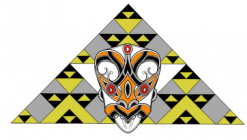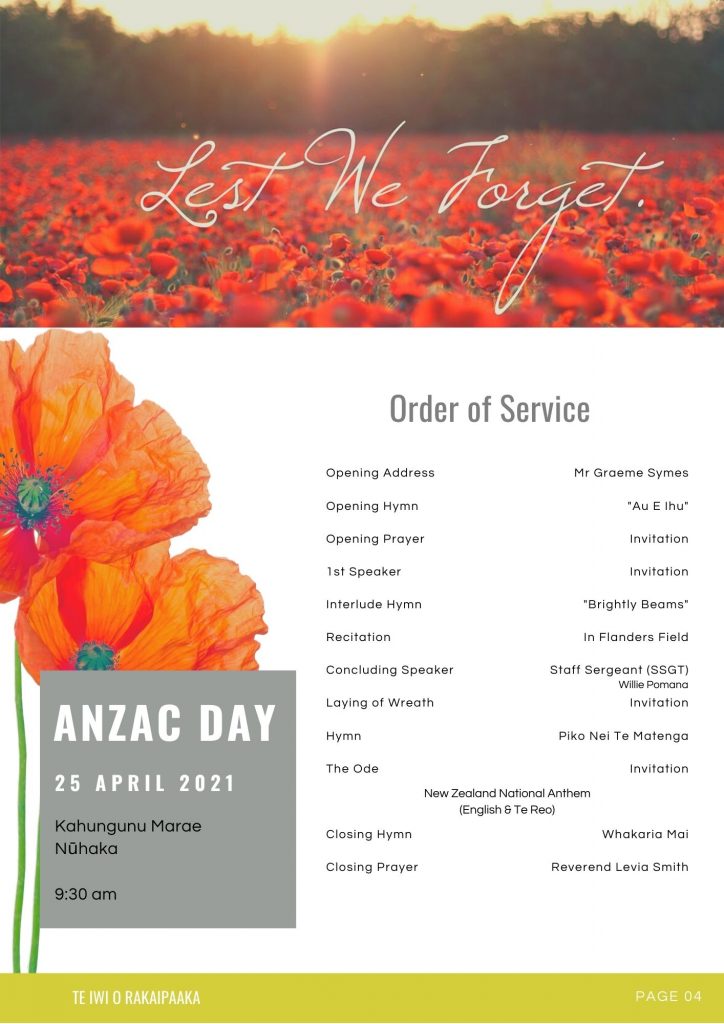ANZAC Day Service

This year the Anzac Day commemoration was observed on Sunday 25 April 2021 and held at the Kahungunu Marae in Nūhaka. It commemorates those who died serving New Zealand during war while honouring returned and current servicemen and women, past and present.
ANZAC (Australia and New Zealand Army Corps) Day marks the day when soldiers landed at Gallipoloi in Turkey, the site of New Zealand’s first major battle of World War One with the loss of over 2,700 New Zealand soldiers.
Our Anzac Day service started with an opening hymn, prayers and guest speakers, Staff Sergeant (SSGT) Willie Pomana & Liz Hunkin. Both speakers shared their touching experience and stories. Staff Sergeant (SSGT) Willie Pomana has been in the Army for over 25 years and talked about his role in the Army as well as his experiences. He then went on to explain the two haka that he then performed while Liz Hunkin shared the stories, she remembers from her tīpuna and read a translated excerpt from her Uncle Hemi Potatau’s memoirs, ‘He Hokinga Mahara’ which he wrote when he was in his late 70’s. His book was first published in 1991.
The excerpt tells of the First World War and the second piece was about her Uncle’s experiences preparing for going overseas to Egypt.
These are the two photos that Liz Hunkin shared on the day...

Tipene Pōtatau
He wasn’t very long in France when he developed pneumonia. It took quite a while before he got back to England. From there they sent home back to New Zealand on a ship. They sent him to Cambridge to the Soldiers Hospital there, where he died and is buried.

Hēmi Pōtatau
Went to school in Nūhaka, then to St Stephens Māori Boys College and then to Scots College in Wellington. They have named one of t heir dormitories after him. He also wrote a haka called “Kotarani’ (Pg .45) 1926 he went to Otago to Theological Hall to becomea Presbyterian minister. (After the war) He arrived back after the war 3rd January 1945. He became Moderator of our Māori Mission about 1960’s, then he moved to Auckland. While ministering in Auckland he attended Auckland University and completed his B.I. there. He must have been narly to when he graduated. After his wife, Aunty Ire died he moved down to Wellington and began learning Mandarin at Victoria.
Excerpts from the book He Hokinga Mahara - Read by Liz Hunkin

Page 33
In 1917, Mr South started up a putorino (flute) group at Nūhaka School. In May of that year, forty-three Māori soldiers from Mahia, Te Wairoa and Nūhaka were coming to stay at Te Tahinga. In 1917 Te Tahinga was situated near the river, a short distance from the bridge. The soldiers were coming to rest in Nūhaka for a week before going on to Takapuna where they were camped. After a short stay there, they would leave to go overseas to the war in France.
Our flute group were to go to meet the soldiers along the road near Waipuia and lead them, with our flutes and also our drums. There were more than thirty of us in our band. I was thirteen at the time. We lead them for about a mile. How proudly we played our flutes and drums. To this day, I can still hum the tune we played that day. My older brother Tipene was one of the soldiers going to war. Jack Ormond was their officer, now deceased, and Turi Carroll was their sergeant, he also is deceased. Before he died, he received an honour from Queen Elizabeth, the Second. He was knighted.
Pages 117 & 118
We joined the 6th Division at Pakakura in May 1941. Cannon Pani Panapa, was the Anglician Chaplin. He looked after all of us very well. We received our uniforms, our guns and of course our bayonets. We were to use our bayonets but this wasn’t a problem for us as it was like the taiaha drill. One day we went shooting with the 5th Division. I lay on my stomach and started to shoot with 33 not a 22.
Every day was different. Running, playing basketball, to exercise the body, the hands and the legs. At times we would have competitions between the companies. As we completed our training, we were allowed to go home for two weeks. I returned to Nūhaka, by now I was a kapra (corporal). A question arose as to why some had been sent to the Officer’s Training at Trentham. Sir Apirana Ngata’s reply was that their people chose who would be an officer and lead their people of the 28th Battalion. Our farewell evening was held at the Unity Hall. There were five of us, 4 Māori and one Pākeha. On returning to Papakura we prepared to go to Egypt.
About the 28th of June, in the evening, we boarded our train taking us to Wellington. When it dawned the next day, we were at the wharf in Wellington and before us stood our ship the “Acquitania’. It was so huge, and so tall, I had never seen such a ship ever before. We went aboard. We, the Māori soldiers numbered about five hundred. Our Officer in charge was Hamiora from Te Arawa. Altogether there were about four thousand soldiers on board. The next day we sailed to Sydney. It was here we were to meet up with the ‘Queen Elizabeth’ and the ‘Queen Mary’. We joined the ships and sailed around the southern tip of Australia to Perth. It was here we ran into a terrible storm. Our ship tossed and turned as well as dipping, as the storm was so bad. It wasn’t long before the water was coming into where we were sleeping. We were situated near the engines. As the propellers were turning the water would come in. We worked hard filling buckets and having to go up to the washrooms to empty them. The first day I had mates helping, but the next day, I was on my own as my mates were suffering from seasickness. At mealtimes I was the only one at my table. Luckily others came to help with emptying the water. I was quite sad we were put there to sleep but I must humble myself.
Kōrero of SSGT Willie Pomana & Haka preformed.
During his kōrero Staff Sergeant Willie Pomana talked about his time in the Army, with over 25 years of service and many experiences to share, he went into detail about the Haka he performed. All that attended on the day were left in awe as he performed the two heartfelt haka. We can only imagine the intensity of the atmosphere of a hundred soldiers as they performed Haka Tuatahi o Ngāti Tumatauenga as part of the New Zealand Army & Haka Tuarua o Kaipukaha as part of the Corps of New Zealand Engineers.

